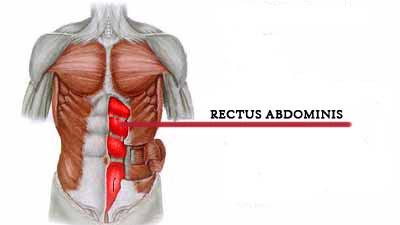Braden | Thu September 25, 2008
myth # 5- You have to train you abbs everyday to get a six pack
Treat your abs like any other muscle, overload the muscle with brief intense training sessions, and allow enough time for recovery between workouts.

September 15 2008
I see this myth all the time in the gym, but see no logic whatsoever. If you use weights for biceps, chest and every other muscle, why not use weights for abs? Your abdominal muscle is no different than the rest of the muscles in the human body.
If you can already see your abs, using weights can only make them look a lot better. If it is under a thick layer of fat, your focus should be on your diet and cardio than ab exercises in the first place.
The only ones who should stay away from weights for abs are those have a lot of fat around their abs; doing abs with weights can make their stomach look bigger as the muscle grows underneath. This is probabaly the number one ab exercise myth.
Spot reduction is the most well known myth in fitness. Ironically, you see people in every gym across the world trying to “spot reduce”. You cannot lose fat from a specific area on your body by exercising that specific area, period.
Women have more fat on the back of their triceps & hip; men have more fat on their low abs and low back. It is simply because that’s how we are wired genetically and is not because you do less exercise for these specific body parts. So it doesn’t really matter whether you do low, medium or high reps for your abs, or for that matter any other muscle.
When you start losing weight (eating less and doing cardio), the body gradually loses fat from those stubborn areas, including your abs.
The use free weights by athletes, functional training and movement training are based on one theory called the theory of Specificity - It says strength, balance, & coordination is very specific to the movement.
Simply put, if you want to get better at running, you run; if you want to get better at running on a treadmill, you run on a treadmill not outside. The more close the exercise to the movement or skill which you are trying to improve, the better. So if you lay on a ball and do crunches, you will only become more balanced lying on a ball and doing crunches. The balance you gained lying on the ball won’t carry over to other activities, like running or walking.
Anatomically speaking, there is no lower or upper abs. The rectus abdominis is one single muscle. They are called upper and lower abs because they are innervated by different nerves and hence could be emphasized differently. And even if they could be emphasized, leg raises do not do a good job.

The major function of the rectus abdominis muscle is flexion or rounding of your spine. If you are just raising your legs without rounding your spine, you are mainly using a different muscle group called hip flexors. This is simply because ab muscles are not attached to your legs and hence abs in no way can raise your legs. The burn you feel from leg raises is mainly from the hip flexors which run deep below the lower part of the abdomen.
If you want to emphasize lower abs, make sure your round your spine when you bring your legs up. The same applies for upper abs too.
Braden | Thu September 25, 2008
myth # 5- You have to train you abbs everyday to get a six pack
Treat your abs like any other muscle, overload the muscle with brief intense training sessions, and allow enough time for recovery between workouts.
Anoop | Fri September 26, 2008
Good one!
I have heard somewhere, years ago, that your Abdominal muscles are able to be ‘worked’ to fatigue and then some, without total detrimental depletion of glycogen and a negative effect on their development? Is it o.k. to work them everyday?
Fact or Myth?
Thanks!
Anoop | Tue October 21, 2008
Hi MFox
Good question.
One reason why they say is that rectus abdominus are mostly Type 1 fibers or endurance fibers. Endurance fibers take longer to fatgue because they have more mitochondria, blood capillaries and therefore much more energy efficient than Type 2 fibers.
But the metabolic profile of a muscle has nothing to do with growth. If anything, Type 1 fibers’ growth potential is much less than Type 2 fibers. Muscles grow if there is overload.
So I would say it depends on your goals. If you just want to work your abs everyday, you are fine. If your goal is improve body composition or strength, you don’t want to do it everyday.
Hope it helps
Jim @ Total Body Fitness | Tue February 10, 2009
It’s funny how long it takes the fitness community to catch up with the data. I remember reading and article about myth one over 1o yrs. ago, yet “we” still advocate high reps for six pack abs.
Thanks
Anoop | Wed February 11, 2009
Hi Jim
It is psychological. I think it has now become ingrained in our brain that we cannot change it so easily. And people don
Thanks for putting to rest some of the many myths we think of when we workout.
© 2008 - 2025 | Exercise Biology. All rights reserved.